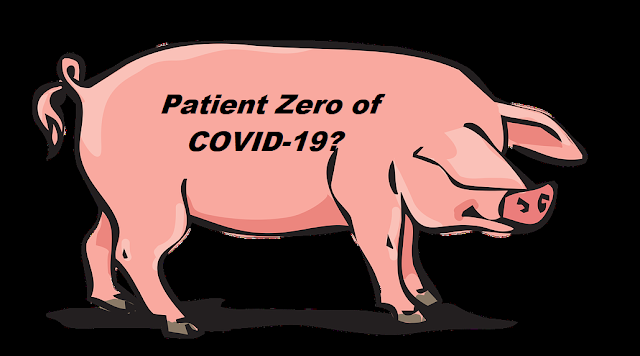Will new Swine Flu concerns force China to test its pigs for SARS-CoV-2?
Flu virus with 'pandemic potential' found in China
https://www.bbc.com/news/health-53218704
The ACE2 receptors in pigs might indicate that pigs are a big issue for COVID-19
ACE2 receptors have been shown to be the entry point into human cells for some coronaviruses, including the SARS virus. A number of studies have identified that the entry point is the same for SARS-CoV-2, the COVID-19 virus.
https://en.wikipedia.org/wiki/Angiotensin-converting_enzyme_2
Dr Helena Maier, from the Pirbright Institute, said: 'Coronaviruses are a family of viruses that infect a wide range of different species including humans, cattle, pigs, chickens, dogs, cats and wild animals
https://www.dailymail.co.uk/news/article-7995507/How-China-rounds-coronavirus-suspects-Shocking-video-shows-woman-screaming-metal-box.html
Will this video force scientists to consider pigs as the possible intermediate vectors of Covid-19?
#Breaking #usda— HHV-6 University (@HHV6_University) February 20, 2020
Will this video force scientists to look more closely at pigs as the intermediate vectors of the Wuhan coronavirus? https://t.co/4wUuDDboy9
Microbiologist Florian Krammer suggests pigs might be the intermediate vectors of SARS-CoV-2
The final host here is humans. So the 'intermediary host' (if there was one) cannot be a human. Instead of looking for far fetched explanations, how about an easy one. SARS-CoV-2 binds well to swine ACE2. Bat-->swine-->human makes a lot of sense/high probability. Like Nipah....— Florian Krammer (@florian_krammer) February 16, 2020
 Prof. Florian Krammer received his advanced training in biotechnology and applied virology at the University of Natural Resources and Life Sciences, Vienna (Mentor: Dr. Reingard Grabherr), where he gained extensive experience with expression and purification of recombinant (glyco-) proteins and influenza virus-like particles. He established various expression systems for these proteins using insect cells/baculovirus, mammalian cells, bacteria, yeast and plants. Furthermore, he worked on a novel influenza virus rescue system based on baculovirus transduction of mammalian cells and a novel bioassay to measure inhibition of the influenza virus polymerase complex by cap-snatching inhibitors. He graduated from the University of Natural Resources and Life Sciences, Vienna in 2010.
Prof. Florian Krammer received his advanced training in biotechnology and applied virology at the University of Natural Resources and Life Sciences, Vienna (Mentor: Dr. Reingard Grabherr), where he gained extensive experience with expression and purification of recombinant (glyco-) proteins and influenza virus-like particles. He established various expression systems for these proteins using insect cells/baculovirus, mammalian cells, bacteria, yeast and plants. Furthermore, he worked on a novel influenza virus rescue system based on baculovirus transduction of mammalian cells and a novel bioassay to measure inhibition of the influenza virus polymerase complex by cap-snatching inhibitors. He graduated from the University of Natural Resources and Life Sciences, Vienna in 2010.
Prof. Krammer’s post-doctoral work in the laboratory of Dr. Peter Palese at the Department of Microbiology at the Icahn School of Medicine at Mount Sinai, New York focused on the development of broadly neutralizing anti-hemagglutinin stalk antibodies and the design of an universal influenza virus vaccine. The results of these studies have been very promising: After successful testing in animal models (mice, ferrets), studies with this universal influenza virus vaccine are now advancing to human clinical trials.
Currently Prof. Krammer holds a position as a Professor of Vaccinology at the Department of Microbiology at the Icahn School of Medicine at Mount Sinai. He has published more than 100 papers, is member of the editorial boards of the Journal of Virology, Plos One and Heliyon and is a peer reviewer for more than 30 journals. Dr. Krammer is also member of the Vaccine and Edward Jenner Society Young Investigator Program. In addition he is a scientific adviser for enGenes and PathSensors.
Since 2019, Prof. Krammer is the Principal Investigator of the Sinai-Emory Multi-Institutional Collaborative Influenza Vaccine Innovation Center (SEM-CIVIC). Our CIVIC aims to develop improved seasonal and universal influenza virus vaccines that induce long lasting protection against drifted seasonal, zoonotic and future pandemic influenza viruses.
The Krammer laboratory – which is also part of the NIH-funded Centers for Excellence in Influenza Research and Surveillance (CEIRS) – focuses on understanding broadly-reactive immune responses against the surface glycoproteins of RNA viruses such as influenza with the goal to develop better vaccines and novel therapeutics.
Source:
https://labs.icahn.mssm.edu/krammerlab/dr-krammer/
The Bortz Virology Group supports investigating possible SARS-CoV-2 infection of pigs
https://twitter.com/BortzGroup/status/1231278408501317632
Source:
https://www.uaa.alaska.edu/academics/college-of-arts-and-sciences/departments/biological-sciences/faculty/bortz.cshtml
Source:
https://labs.icahn.mssm.edu/krammerlab/dr-krammer/
The Bortz Virology Group supports investigating possible SARS-CoV-2 infection of pigs
Twitter Source:Good point @florian_krammer ACE2 is half the battle (for #COVID19 to infect swine). Agree worth investigating if it can infect pigs. Similar happened before with HKU2-like SADS bat betaCoV in pigs, in China (Zhou, 2018, and other reports) https://t.co/C0vW6cJdPO— Bortz_Virology_Group (@BortzGroup) February 22, 2020
https://twitter.com/BortzGroup/status/1231278408501317632
Source:
https://www.uaa.alaska.edu/academics/college-of-arts-and-sciences/departments/biological-sciences/faculty/bortz.cshtml
Pork, Pigs, and the Wuhan C... by rubiconmedia on Scribd
Pork, Pigs, and the Wuhan C... by rubiconmedia on Scribd















